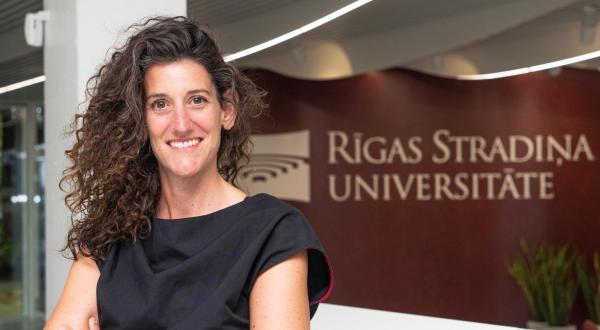New Academic Year and Other News – RSU Rector Interviewed on Latvian Television
The new academic year at Rīga Stradiņš University (RSU) started on Monday, 29 August. The University’s Rector, Professor Aigars Pētersons, was interviewed on the programme 900 sekundes for Latvian broadcaster TV3 where he outlined the results of summer admissions and gave an overview of current and planned reforms in higher education.
RSU has concluded this summer's admissions process noting a surge in both the number of applicants and the number of enrolled students. As the Rector pointed out, this trend has been observed for the past five years. This summer, 13% more applicants expressed an interest in studying at RSU than last year, and approximately 11% more students were admitted. This is a significant achievement at a time when there is a drop in student numbers in higher education. Moreover, as Prof. Pētersons pointed out, despite concerns about the levels of knowledge that secondary school students acquired during the pandemic, newly admitted students are academically prepared: the average level of centralised examinations among this year's first-year students at RSU is around 70-80%. RSU's own activities (the Young Medical Academy (YMA), the YMA School of Pharmacy, the Young Diplomats Academy, etc.) have helped to raise the level of knowledge of secondary school students.
In total, around 2,400 new students will begin their studies at RSU this autumn. In a conversation with Kristīne Komarovska, the programme’s moderator, the Rector outlined that the group of countries represented that the University’s international students come from has changed considerably in the 30 years that RSU has been operating in exporting education. In total, almost a thousand applicants from 79 countries applied to study at RSU this summer, from which 422 international students were accepted. Most of the newly admitted students come from Sweden (36%), Germany (23%), Finland (11.5%) and Norway (9%), while the total number of countries represented by first-year students this summer reaches 35. In total, 2,523 international students from 65 countries are currently studying at RSU, and, as the Rector emphasised, they are mostly attracted by the quality of the programmes, including the simulation technologies used in training, the wide range of visiting lecturers, and the international study bases, rather than by the tuition fees. In this context, Prof. Pētersons also outlined the University’s development plans to open a branch of RSU in the German city of Stade. This would ensure that international students can undergo the practical part of their training in Germany.
Several students from Ukraine will also start their studies at RSU this autumn, and the University is offering them tuition fee discounts and other forms of support, such as covering part of their living costs. In the interview, the Rector also outlined how the University is cooperating with Ukrainian teaching staff and researchers in the fields of social sciences, medicine, and health care.
Further, the Rector described the cooperation with the newly established RSU Council in working out a development strategy and other issues. The Rector also commented on the Ministry of Education and Science’s plans to consolidate universities, the newly established concept of changing the financial model of higher education, tuition fees, and the rise in energy prices.
Related news
 It's important to encourage girls to get into science: RSU tenured professor on inspiration and research in paediatric oncologyInterviews
It's important to encourage girls to get into science: RSU tenured professor on inspiration and research in paediatric oncologyInterviews


